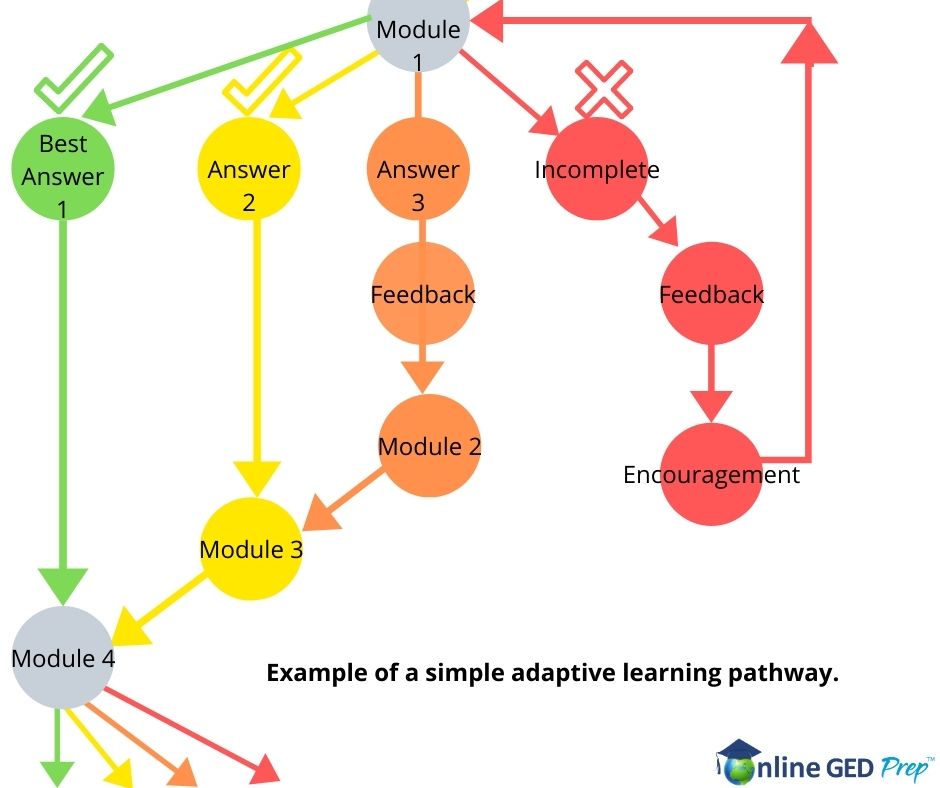
Online GED Prep™ utilises the intelligence of adaptive learning.
The online GED® study programme that we offer is an adaptive learning course. It adapts to suit the skill-level and ability of each individual student.
Let’s focus on the question:
“What is Adaptive Learning?”
Adaptive learning harnesses the power of technology to present learners with customised learning pathways.
It uses insights and features of artificial intelligence, predictive analytics, cognitive psychology, microlearning and gamification. It offers digitally-driven, mastery-based learning.
Adaptive learning is the online equivalent of one-on-one tutoring.
Instead of ‘teaching to the middle’ and delivering identical, one-size-fits-all content to all learners, it presents different lessons to students who have displayed unique levels of competence.
The course automatically adapts the pathway through the content, depending on how each student interacts with the learning material. Different branching paths deliver different types of content based on feedback from algorithms, assessments, student feedback, instructor adjustments and various other built-in features.
A learner who takes longer to master a particular lesson or module, for example, will progress to a different subsequent module than an advanced learner who aces it in record time.
The aim is to provide a personalised learning pathway, in order to increase student engagement and improve retention. Extra practice and remediation are only provided to those who need it, in order to optimise the performance levels of all students.
Below is a simplified diagram of a section of a learning pathway. Each subsequent module could potentially have a variety of branching pathways leading from it. This would create a much more complex sequence of learning content.

- If a learner selects the best answer 1, the she fast-tracks to module 4.
- If she selects answer 2, then she progresses to module 3 for more practice.
- If the learners selects answer 3, which is less than optimal, then she gets tips and feedback and progresses to modules 2 and 3 for extra practice.
- If the learner does not complete the activity, then she gets feedback and encouragement to keep her engaged, so she attempts the question again.
What are the benefits of adaptive learning?

Adaptive learning caters for and engages a diverse range of students
By cutting redundant practice and repetition, the advanced learner can be fast-tracked to new lessons that are unfamiliar and more challenging. The struggling learner can receive remediation, encouragement and feedback, plus extra practice until she masters the lesson. Thus, both learners and those at skill-levels inbetween always receive the most appropriate and effective learning experiences.
For example, a learner who dropped out of high school a few years ago, might have different needs to a learner who has been learning continuously at home or at school before starting the adaptive eLearning course.
The adaptive learning programme can accommodate a diverse range of students, from any age group, socio-economic sector, educational background or learning ability. It can deliver customised learning to large numbers, while respecting and catering for their individual needs.
Autonomous learning
Adaptive learning allows learners to master challenging content at their own pace, usually without the need for a tutor or instructor. This reduces costs and saves time.
Respects prior knowledge and increases engagement
Adaptive learning has a positive effect on learners’ attitudes towards learning when it makes them feel that their prior knowledge is respected and acknowledged. They appreciate not being forced to waste time on boring, repetitive lessons. They tend to view the learning programme as a beneficial tool, to aid their learning, rather than a chore to endure.
Meaningful interaction
Adaptive learning courses can offer useful feedback and other meaningful interactions, which increase learner engagement and promote mastery effectively.
It caters for an increasingly tech-savvy generation

Modern learners are eager to learn, but they want learner-centric, flexible online education that can be accessed anytime, anywhere. They want to be in control of their own learning and they don’t want to waste time on education that is not strategic and laser-focused. They don’t want useless frills! Cutting the time it takes to achieve mastery is also very motivating for students. Their efficient progress has a positive impact on their attitudes towards learning.
In the online GED® prep course, adaptive learning is paired with mobile learning in bite-sized lessons, which can be consumed anytime, anywhere, on any internet-connected device.
Learners can experience the power of intelligent technology. They can use the tools of this millennium to build their knowledge and skills and equip themselves to participate in that economy.
That’s what 21st Century learners want:
21st century tools and skills. Freedom from obsolete education.
Take a free trial today and see it for yourself.